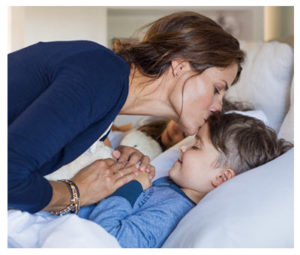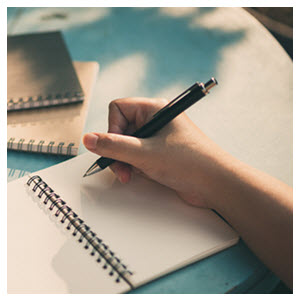Are rituals important to you? They’re certainly important to me, and to most of us when we stop and think about the daily rituals that enhance our lives.
 We often speak of rituals in religious terms; the very derivation of the word comes from “rite,” yet rituals serve us in the personal as well as religious realm, and they do so in a breadth of contexts.
We often speak of rituals in religious terms; the very derivation of the word comes from “rite,” yet rituals serve us in the personal as well as religious realm, and they do so in a breadth of contexts.
What about our morning routines that we follow meticulously to start off the day in the best, most energized, most positive light?
What about those nighttime exchanges we share with our little ones so they feel loved and secure?
What about athletes, performers, and business people who adhere to a strict routine before taking to the stadium for a match, to the stage for a show, or to the podium for a speech or presentation?
What about the Pledge of Allegiance, the fraternity pledge, a swearing-in ceremony with an oath of office?
The Importance of Everyday Personal Rituals
Rituals, like rites, are about words and actions. Our daily lives are filled with them, though we likely don’t pay attention unless change alters or shatters their rhythms.
Then, we note their absence and their role in what we perceive as “normalcy.” When life is swirling around us, we cling to whatever shred of recognizable ritual we can find to restore familiarity, comfort, and a measure of control.
I recall the months, years really, as my boys found themselves reeling from divorce and fighting their way to a new normal. One spoke openly of his anger and fears, allowing me to address them directly. But the other withdrew. Bedtime routines transformed into rituals. Our goodnights required a prolonged, private exchange as we cycled through endless stories, cuddling, conversation.
And capping off our goodnight was a sing-song refrain I’ve written of before — both beautiful and bittersweet — a very specific back and forth of “I love you” until he seemed satisfied enough, safe enough to close his eyes.
Rituals Are More Important Than We Realize
Wiki defines ritual as a:
… sequence of activities involving gestures, words, and objects, performed in a sequestered place, and performed according to [a] set sequence”
Does my nightly exchange with my son fit this bill? I think so. Moreover, I witnessed the benefit of the exchange — to both of us.
Social psychologists describe how rituals shape and reinforce our place in the world around us. As this NPR report on the psychological effects of rituals explains:
… researchers find that complex rituals change how people interact with one another, especially when it comes to the amount of trust they repose in others.
Clearly, rituals are important to groups, reinforcing a sense of belonging, identity, and teamwork. For example, consider the team cheer in the locker room before the big game.
Was a similar psychological dynamic at work in the bedtime ritual with my eight-year-old? Was the tacit message that we belonged to each other, that we were a team, that no matter what, family remained intact?
Daily Rituals Bridge Old to New
Rituals become critical when we’re dealing with change. And not just “negative” change — loss and disappointment — but any change that uproots and disorients us.
 One of my recent discoveries in undertaking a major relocation in the past year — okay, I changed everything in my life in one fell swoop — has much to do with the usefulness of rituals.
One of my recent discoveries in undertaking a major relocation in the past year — okay, I changed everything in my life in one fell swoop — has much to do with the usefulness of rituals.
In a place where I knew no one, in a rented space where I could find nothing, in a neighborhood that felt so different from what I was accustomed to — restoring routines as simple as pre-dawn coffee and journal writing, treating that practice as something personally sacred, engaging daily at a specific time, in a specific way — I used ritual to combat overwhelming feelings of disorientation while processing enormous change.
Daily rituals bridge old to new; by integrating familiar routines in a new environment, we can ease our way into what seems strange, unknown, frightening.
By elevating routine to ritual, we engage in motions and refrains that do more than comfort us. They become treasure, defining and sustaining us, certainly in part.
Are Rituals the Same as Traditions?
It’s easy to confuse rituals and traditions, and there’s definitely overlap when we’re talking about ceremonial observance of holidays or family events.
I don’t wish to discount the importance of religious ritual — to some of us, it can be both beautiful and moving. It can be expressed in the context of worship, respect for cultural norms, as well as in a personal context.
The act of lighting candles for example, whether in a church or at home, may blend acts of faith, tradition and even superstition. Yet typically, traditions are rituals or customs that are handed down through the generations. They endure beyond ourselves.
Personal rituals, even as simple as habits and practices that make us feel connected — a birthday wish on a candle, the goodbye kiss at the door executed in exactly the same way with the same words — can become so ingrained, so enjoyed, so profoundly associated with people, place, and contentment that we seek to replicate them as we grow up. And, we pass them down to our own children, continuing small rituals as much-loved traditions.
Joyful, Poignant, Important
Wiki’s definition also tells us:
Rituals are part of all known human societies. They include not only the worship rites and sacraments of organized religions and cults, but also rites of passage, atonement and purification rites, oaths of allegiance…
 From private, morning meditation routines to honoring formalized faith to fêting holidays in ways to charm our children (milk and cookies for Santa’s reindeer?) — rituals serve an essential purpose. Rituals bond us to each other, to our histories; they bind us to beliefs and perspectives that transcend a sense of our smallness, and instead, they reassure, reinforce, and remind us of who, where, and how we are.
From private, morning meditation routines to honoring formalized faith to fêting holidays in ways to charm our children (milk and cookies for Santa’s reindeer?) — rituals serve an essential purpose. Rituals bond us to each other, to our histories; they bind us to beliefs and perspectives that transcend a sense of our smallness, and instead, they reassure, reinforce, and remind us of who, where, and how we are.
Isn’t this part of why we refer to the ritual phone call home, the ritual Sunday night dinner, the ritual boys night out or gathering of college friends for brunch? Don’t rituals bring us a multitude of benefits including joy, the making of memories, a sense of belonging?
I Love My Rituals!
Personal rituals can be fundamental to identity, to safety in an emotionally and physically “dangerous” world, to a connective thread that reaches back through generations and, we hope, ahead for those to come.
In the repetitions and refrains created of ritual, we are comforted by familiarity in unfamiliar places and situations. We reorient. We reassert. We re-establish ourselves in the face of what’s new and frightening.
Sometimes, I think back to that bedtime ritual with my son — all those worrisome, wrenching, precious hours together born of fear, hurt, trust and ultimately, love.
I am reminded that rituals are powerful gifts during times of uncertainty, pain, and stress. What we create, practice, and render sacred becomes tender sustenance, a lifeline when we are vulnerable, and whether we realize or not at the time, a celebration of what is good, known, and shared.
If you enjoyed this post, please share, and do share your favorite family rituals!
You May Also Enjoy
Ah, yes. We are in a similar place today — but you go much deeper and while “habits” are helpful, I like thinking of them as rituals as you discuss here.
? Especially helpful in a new place, don’t you think?
Great thoughtful piece. I’m not a fan of rituals personally. I prefer variety and find them restricting. But I have a friend who loves them and finds great solace in a routine and having landmarks in a new environment. But having said that I do have daily habits and routines which are part of my schedule! So perhaps I have them anyway!
I really like the way you talk about the emotional component of ritual. I saw the words “comfort”, “connectedness”, “belonging”, all of which resonated.
When one or both of us return from being out of town it gives a surprising sense of comfort to “get the house running” again – paying bills, doing laundry, mowing the lawn, and simply refocusing attention to all things “home”, or “us” related.
There are certain places we like to go that provide structure for our sense of identity; when we start leaving ones out it feels like our life is not our own. Most of these places are restaurants, but we have noticed how satisfied, and normalized, we feel when we regularly haul a load of tree debris or household recyclables to our favorite recycling station.
The bed time ritual with your son really hit home. Slipping away from the simple saying or kissing of Good Night was an early warning of deep problems in our house, and restoring it has been a key part of rebuilding. It is especially important when you go to bed at different times, or to different rooms. And of course bookending the day by starting with a Good Morning is as important.
A trip to the beach for deep conversation, which, when not maintained, is another sign we are getting off track. Those conversations don’t have to go well, and sometimes they don’t. But it is far more important to the big picture that we keep having them, even when they are uncomfortable, if not near traumatic.
Over time I’ve come to the realization that loving is evidenced and maintained through “doing”. Although the emotional component is what we tend to think of most, it is the structure imposed by doing that keeps it alive.
I came looking for personal rituals and found this blog post. My gf has this ritual of having a cigarette by herself in solitude before going to bed. I agree rituals are important and have reason to exist in our lives for emotional centering oneself daily, or just to cope. However, nicotine is a very addictive substance. I wonder if any of you have thought about finding reasons for your own rituals and perhaps possibility of replacing one ritual with another. (In this case perhaps a physically less burdening ritual).
Wonderful question. Now I am curious, too. Anyone?